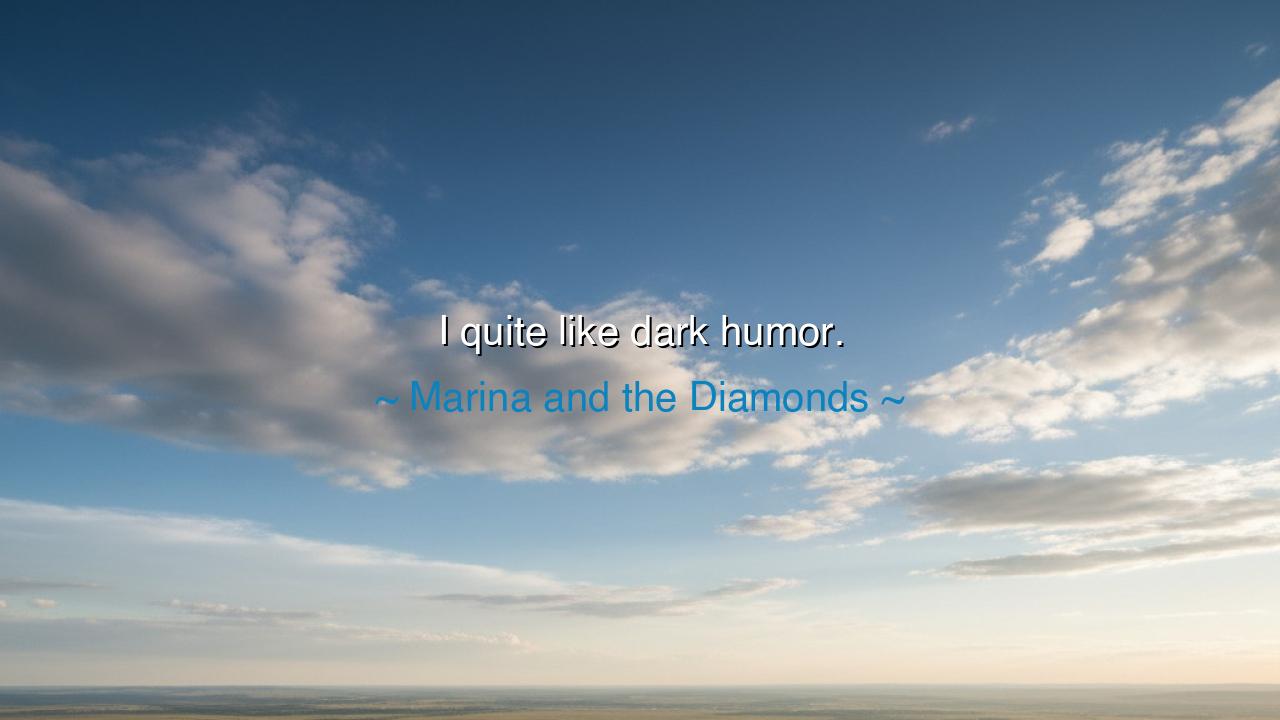
I quite like dark humor.






In the words of Marina and the Diamonds, “I quite like dark humor.”
A short phrase, simple in sound, yet beneath it lies a deep river of meaning — a truth known to every soul that has ever suffered and yet found laughter amidst the ruins. For dark humor is not the laughter of cruelty, but of survival. It is the laughter of those who have looked upon the shadow and refused to be consumed by it. It is the voice that whispers, “I will not let despair have the final word.” When Marina speaks these words, she aligns herself with an ancient tradition — the defiant joy that arises from pain, the light that gleams in the heart of darkness.
To understand dark humor, one must first understand the nature of darkness itself. Life, in all its beauty, carries within it grief, loss, and absurdity. There are wounds that cannot be mended by comfort, sorrows that no gentle word can ease. Yet in the face of this, humankind — frail, transient, and brave — has always laughed. From the ashes of tragedy rises wit, sharp and strange, cutting through the heaviness of existence. Dark humor is born when the soul transforms agony into irony, when suffering becomes art. It is not mockery of pain, but mastery of it.
The ancients themselves knew this power. When the playwright Aristophanes made the citizens of Athens laugh at war and corruption, he was not blind to suffering — he was teaching them to endure it. When the Stoic philosophers spoke of laughing at misfortune, they did not trivialize pain; they transcended it. Even the soldiers of ancient Rome, standing at the edge of battle and death, traded grim jokes beneath the weight of their armor. Their laughter was not joyless — it was courage disguised as mirth. For to laugh in the face of darkness is to declare, “You may strike me, but you cannot silence me.”
So too does Marina’s fondness for dark humor carry the same defiance — the modern voice of the ancient soul. Her art, like her laughter, embraces the shadow without surrendering to it. She, like many who create, understands that the world is both beautiful and cruel, radiant and hollow. Dark humor is her balance between these extremes, the middle path between denial and despair. It allows her to acknowledge pain honestly while refusing to let it become her master. It is laughter that redeems, laughter that reclaims power from sorrow.
Consider the example of Winston Churchill, who faced the terrors of war with a wit as unyielding as his resolve. When bombs fell upon London, he quipped, “We shall fight on the beaches — and if necessary, in the cellars.” His humor was not frivolous; it was armor. Through it, he gave his people permission to laugh amid fear, to see that laughter could coexist with valor. This is the essence of dark humor — not to diminish suffering, but to outshine it through irony and intellect. The man who can laugh while surrounded by shadows proves that he is still free.
Yet dark humor must be wielded with wisdom. It is a double-edged blade — sharp enough to cut despair, but dangerous when turned toward cruelty. The wise use it not to wound, but to heal, not to mock others, but to keep their own spirits alive. It is not the humor of mockery, but of acceptance — the acknowledgment that pain exists, but that life must continue. The one who laughs at sorrow learns that even in darkness, there remains a spark of light.
Let this be the teaching then: do not fear the darkness within or around you. When life becomes unbearable, find the courage to smile, to see irony where others see only ruin. Laugh gently at your own misfortunes, not out of scorn, but out of understanding. For dark humor is the laughter of wisdom — the laughter of one who knows that even pain has a place in the great design.
And so, dear listener, remember Marina’s quiet confession: “I quite like dark humor.” It is more than preference — it is philosophy. To like dark humor is to love truth, to see beauty even in the broken, to hold both the tear and the smile in the same trembling hand. When you next find yourself in shadow, do not curse the dark. Laugh softly, as the ancients did, and let that laughter be your torch. For humor, even the darkest kind, is not the absence of light — it is the proof that light can never truly die.






AAdministratorAdministrator
Welcome, honored guests. Please leave a comment, we will respond soon